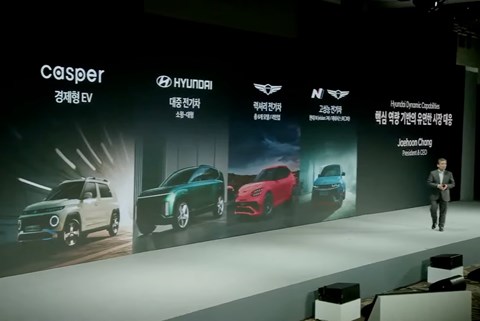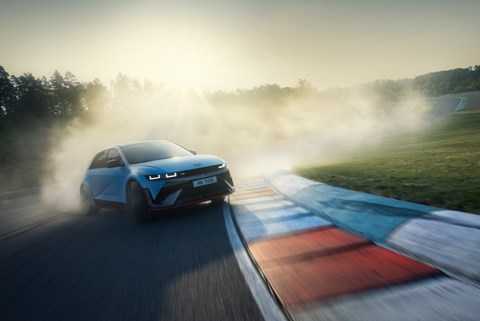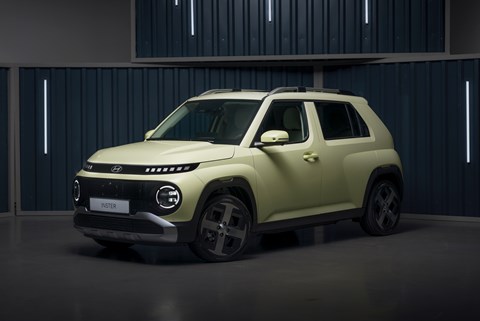► The latest update on Hyundai’s electrification plans
► Production-spec N Vision 74 is incoming
► But Hyundai is diversifying into ‘EREVs’ – range extenders
Hyundai has outlined its latest electrification strategy as part of its 2024 Investor Day, giving us a first look at its future plans for new models, and a more diversified line-up for the future.
The brand calls the new directive the ‘Hyundai Way’, aiming to sell two million pure electric cars by 2030. The headline information includes the official announcement of the Hyundai Ioniq 9 model, as well as a confirmation of a production version of the brand’s wild and retro N Vision 74 concept car hidden in a single slide during the Investor Day presentation.
Wait, what? The N Vision 74?!

Yep, that one. Hyundai has decided to put its money where its mouth is with the utterly fantastical concept car that captured everyone’s attention a couple of years ago. The only information we really have is from that one slide in the presentation (blurry image above), being part of Hyundai’s future range of electric cars. Meaning that whatever the production model looks like, it’ll be a battery-electric car.
Range extenders?
Indeed. Just as the rest of the industry has noticed and reacted to the slowdown of electric car demand, Hyundai has announced its plans to develop a range of ‘EREVs’ – its own name for a range extender. Range extenders are vehicles driven by electric power, but have an engine on board that’s solely there to charge the battery, with cars like the Mazda MX-30 REV and Nissan Qashqai E-Power being examples of them currently on sale.
The first EREVs from Hyundai are expected from 2026 onwards. Without being specific, Hyundai has announced that a C-segment (i.e. i30 or Tucson-sized) car for the Chinese market and a D-segment (i.e. Santa Fe-sized) one launching for the North American market will be the first ones. Hyundai says that its EREVs will be capable of around 560 miles of range.
What are Hyundai’s current electric cars?
Hyundai’s range of EVs started with the likes of the Kona Electric and original Ioniq, before venturing into models that also run on the brand’s innovative E-GMP architecture.
E-GMP was among the first grand-scale and hugely scaleable battery-electric car architectures to hit the market, being deployed by Hyundai, Kia and Genesis. The E-GMP platform uses an 800-volt architecture for lighter electronics and extreme charging speeds, and every car that’s had it applied has had the ability to externally power devices.
These are the Hyundai EVs currently on sale:
Kona Electric
Recently updated in 2024 with a crisper design outside and a more modern interior, too. Kona Electric models are capable of up to 319 miles on a charge. It’s a grown-up sort of EV, twinned with the equally-grown-up Kia Niro EV.
Ioniq 5
The first car to use E-GMP, and one that knocked us sideways with its dramatic design and technology when it first landed. Since then, it’s become one of our favourite electric cars, and recently underwent a model year update to tweak the formula.
Ioniq 5 N

N’s first electric car, and it’s a damn good one. The Ioniq 5 N is arguably the best electric hot hatchback you can buy right now, with its ace styling and fantastic handling. In an effort to convince some car enthusiasts that electric cars can be fun, the Ioniq 5 N is beriddled with software and technology designed to make it a real handler on track, drift like the best rear-drive cars out there and rev and ‘change gears’ like a car with a combustion engine. We’re in love.
Ioniq 6
The follow-up to the 5, designed as a properly sleek streamliner. The Ioniq 6 is very much like the 5 underneath but with a completely different design concept.
What future Hyundai electric cars are coming?

Inster
Hyundai’s efforts to make the EV more affordable starts with the Inster. If it looks familiar, that’s because it’s directly linked to the Casper – a small city car available in Korea, but with a combustion engine. The Inster is expected to cost around £22k, and be a rival to the Dacia Spring and Citroen e-C3.
Ioniq 9
Effectively the real production version of the Hyundai Seven concept. It’s a full-size, three-row electric SUV that’ll be a very close sibling to the Kia EV9 as well as a battery-electric counterpart to the latest Santa Fe. Naturally, given it’s an Ioniq model, the 9 will run on the E-GMP platform.